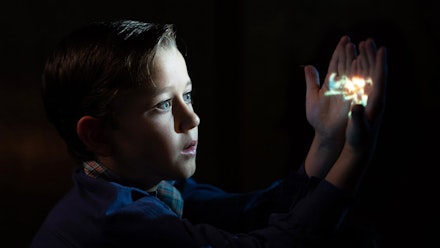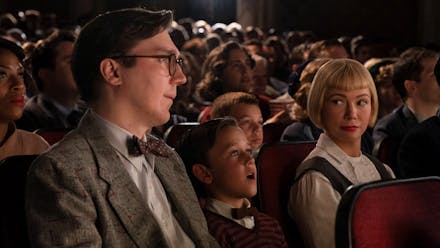The young Steven Spielberg — or at least, his on-screen avatar Sammy Fabelman (Gabriel LaBelle) — learns a lot in this film. About his parents, about himself, about secrets, about lies, about death, about art, about anti-Semitism, about horny teenage girls, about chaotic monkeys and, of course, about filmmaking. After a formative trip to the cinema, Sammy begins making home movies, and soon discovers how the camera can comfort, thrill and shock. He also learns what cinema tells us about people; how it can elevate them, reflect them, devastate them. Most of all, he learns how it can give us truth. Or bury it. “You really see me,” his mother Mitzi (Michelle Williams) tells him, in the film’s most chilling sequence.
Truth is everything in The Fabelmans, in which the world’s greatest showman finally takes us behind the curtain. As he grows as a fledgling filmmaker, young Sammy (via an appropriately self-assured yet sensitive performance from LaBelle) chides himself for some unconvincing footage. “Fake,” he says. “Totally fake.” Nothing in The Fabelmans feels fake, even if its director (and co-writer, along with Tony Kushner) maybe embellishes events here and there. With this, Spielberg opens up like never before, telling a story he’s been itching to get to for some time, finally emotionally ready to do it. And he does it with tenderness, with a careful camera, with slow zooms always drawing us in to people, always getting closer.

The overall feeling — and this shouldn’t come as a shock, from Spielberg — is empathy. This is a hugely empathetic, and sympathetic, tribute to his parents, and the film is Spielberg making peace with what went on, with the events that turned a boy into a man. It feels like he’s protecting his mother and father, understanding them, as two troubled individuals with fears and desires and hopes and dreams and just too much on their plates. In turn, it feels as if the cast is protecting a still-wounded Spielberg, playing his family (and him) with painful humanity. As Sammy’s dad Burt, a computer engineer, Paul Dano has the saddest smile. Burt’s best friend Bennie, beloved by the family, is a pitch-perfect Seth Rogen, glowing with warmth. Judd Hirsch’s Uncle Boris, a former circus lion-tamer who crashes into the film like a one-man truth bomb, roars with charisma before exiting just as sharply. And then there’s Michelle Williams, who… well. We go ten rounds with this one.
Mitzi — who chases a tornado, who randomly buys a monkey — feels everything, and Williams — who radiates old Hollywood glamour and staggering naturalism — is exquisite casting. There’s an intentional theatricality to her portrayal (Google photos of Spielberg’s actual mother, Leah Adler, and you see the same sparkle, the same zest), but Williams is just about the best there is at playing damaged souls, which is very much the case here.
It's charming and it's funny, a sunny disposition offsetting the sorrow.
Mitzi is a classical concert pianist who mostly gave that up to raise her kids, and as the film goes on, cracks appear. An early night-time sequence during a family camping trip has her drunkenly dancing in a see-through gown, backlit by car headlights. It’s a magical moment, beautifully scored by John Williams, who gives Mitzi the same trembling sense of awe and wonder he gave E.T.. Her family is concerned but absolutely bewitched — and Spielberg makes us feel just the same.
Despite the film’s often upsetting episodes, an impish playfulness is never far away. This is not documentary. Though almost entirely based on truth, it often feels a nudge from reality (Spielberg hasn’t renamed his family the Fabelmans for nothing), and there’s a gloss to it. But that’s just love. It’s charming and it’s funny, a sunny disposition offsetting the sorrow. It’s one big broken heart, but throughout there is vibrancy. Life.
After previously seeing them all wrapped up in genre, it feels gently shocking to discover so candidly where some of the thematic elements in Spielberg’s work stem from, especially the fractured family storylines threaded through Close Encounters and E.T., with their search for connection from elsewhere. Yet also, this film is the result of all of that filmmaking, 50 years of craft culminating in the story of his life. The very final shot makes it all clear: it’s all about perspective. So yes, only now, heading towards 80, was he ready to make this film, and make it this good. It’s a glowing, transcendent tribute to his mum and dad. It finishes joyfully, and your heart is fed.





